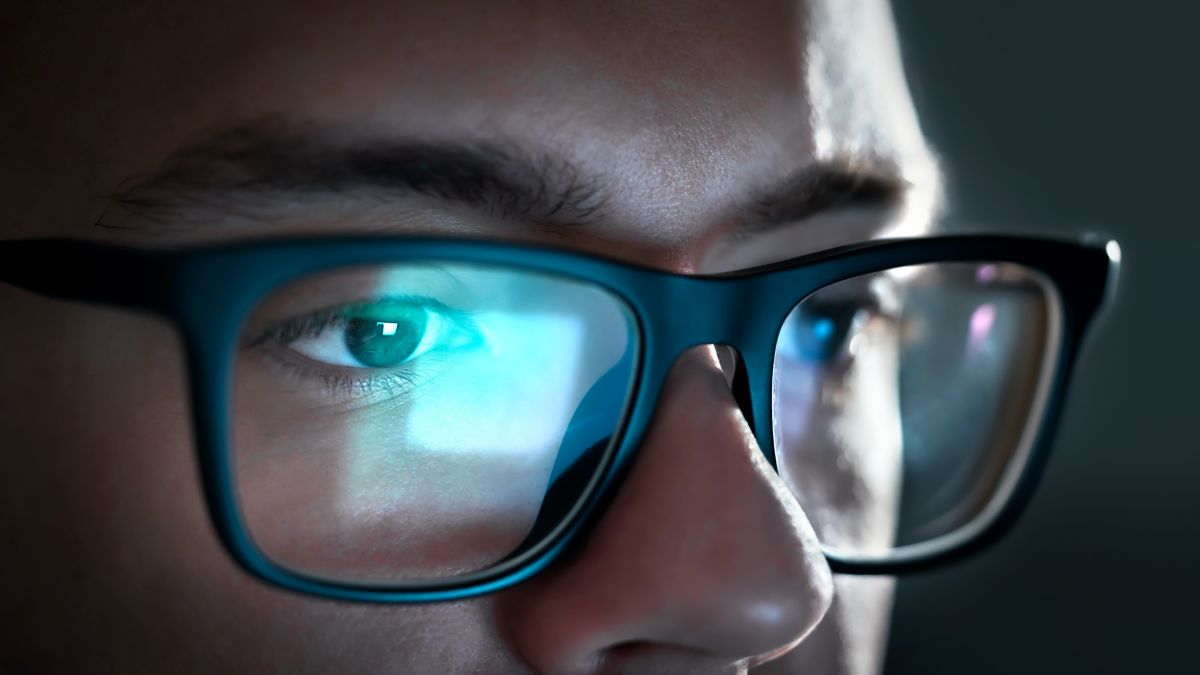Looking at screens for too long can cause eyestrain, but eyestrain existed long before screens. (Driving long distances is another cause, the Mayo Clinic notes.) Eyestrain may involve fatigue of the tiny muscles in and around our eyes, and people who get eyestrain may experience discomfort that includes headaches, blurry vision, watering of the eyes, and sensitivity to light.
There’s a rumor that the blue light from smartphones (or other screens) can ruin your vision, perhaps even leading to blindness, but it’s not backed up by evidence. “The amount of light coming from a computer has never been demonstrated to cause any eye disease,” the American Academy of Opththalmology states in an article on their website recommending against blue-light-blocking glasses. There is research that finds blue light can damage cells in certain lab conditions, but those conditions are very different from what happens in the actual cells of our retina.
Unfortunately, there are companies citing research like this to sell their blue-light-blocking glasses or screen overlays, but they aren’t selling a solution to a real problem. This happened to me recently after getting an eye test for glasses for all day looking at screens. The prescription is actually for vision correction (that’s all) but guess what, the optometrist also sells glasses, and somehow I got hoodwinked into adding blue light lens coatings “to prevent eyestrain”. This adds a considerable amount to the price. In future too I’ll take my prescription and get quotes for glasses (including online) as the whole business seems to be a bit of a scam. I paid double the rate of a GP for the tests and got zero report back.
And regarding affecting sleep, the recommendation is to just have screens an inch or two further away - my screens are at 85 cm which is way further than the recommended 63 cm. In other words we should be better educated about how to use our eyes, and not necessarily just be sold blue light filter coatings on lenses.
See https://vitals.lifehacker.com/what-happens-to-your-eyes-when-you-stare-at-screens-all-1846593909
#technology #vision #myths #bluelight #optometrists



The problem is that when a lot of your time is spent in front of screens, it becomes a problem. There is a very, very good chance that you are looking at text on that black themed screen/interface, and so you are still consuming blue light anyway, even if it may be less.
Blue light is incredibly healthy for us during daytime, and viewing it keeps us energetic and awake. Red/yellow light makes us relaxed, and this effect is most importantly noticeably used in photography (which I do RAW) with warm colour temperatures added to finalised photos for more soothing effect. Warmness has an association with comfort and coziness, while cool colours have association with energy, spark, survival instinct and subtle stiffness/ruthlessness.
Think of blue light as coffee, and red/yellow tint as hot chocolate with brownie.
Your circadian rhythm indeed is determined a lot by what you see on screens if you spend hours daily in front of them. That is just plain facts.
I understand the science behind it, I’m not saying you’re wrong. However I completely disagree on the proportions. I don’t need blue light from my screen, I already have plenty of natural light from many sources. I’ve tested everything I can think of, and my eyes are the most relaxed this way, with dark theme even during the day.
I sleep like a baby, pretty sure my circadian rhythm is fine, even when I spend most of the day in front of screens, so I think I’m good. I’m not saying this is perfect for everybody, just sharing my experience.
It may be the case that you do not spend 8-10 hours daily in front of screens, in which case it might be fair enough and non consequential.
It’s actually more than that, still perfectly fine.